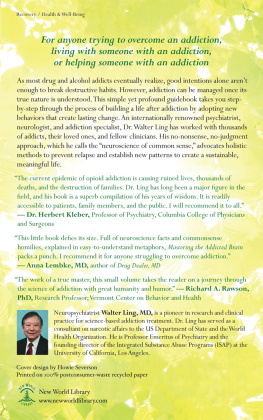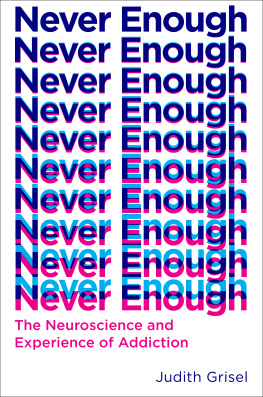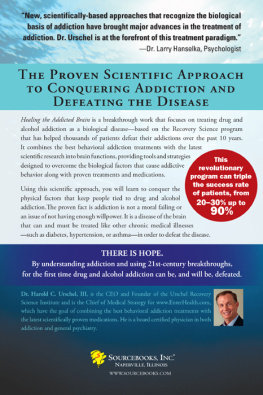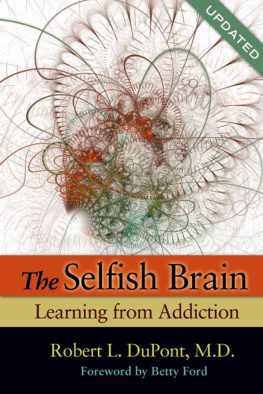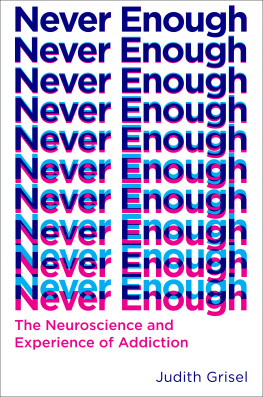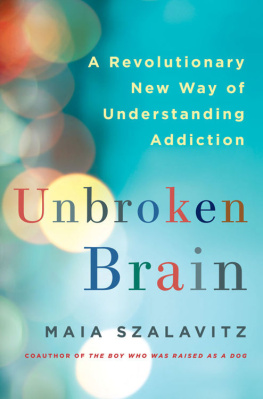The Addicted Brain
Why We Abuse Drugs, Alcohol, and Nicotine
Michael Kuhar
Vice President, Publisher: Tim Moore
Associate Publisher and Director of Marketing: Amy Neidlinger
Acquisitions Editor: Tim Moore
Editorial Assistant: Pamela Boland
Development Editor: Russ Hall
Operations Specialist: Jodi Kemper
Senior Marketing Manager: Julie Phifer
Assistant Marketing Manager: Megan Graue
Cover Designer: Chuti Prasertsith
Managing Editor: Kristy Hart
Project Editor: Jovana San Nicolas-Shirley
Copy Editor: Ginny Bess Munroe
Proofreader: Kathy Ruiz
Senior Indexer: Cheryl Lenser
Senior Compositor: Gloria Schurick
Manufacturing Buyer: Dan Uhrig
2012 by Pearson Education, Inc.
Publishing as FT Press
Upper Saddle River, New Jersey 07458
FT Press offers excellent discounts on this book when ordered in quantity for bulk purchases or special sales. For more information, please contact U.S. Corporate and Government Sales, 1-800-382-3419, .
Company and product names mentioned herein are the trademarks or registered trademarks of their respective owners.
All rights reserved. No part of this book may be reproduced, in any form or by any means, without permission in writing from the publisher.
Printed in the United States of America
First Printing December 2011
ISBN-10: 0-13-254250-1
ISBN-13: 978-0-13-254250-0
Pearson Education LTD.
Pearson Education Australia PTY, Limited.
Pearson Education Singapore, Pte. Ltd.
Pearson Education Asia, Ltd.
Pearson Education Canada, Ltd.
Pearson Educacin de Mexico, S.A. de C.V.
Pearson EducationJapan
Pearson Education Malaysia, Pte. Ltd.
The Library of Congress cataloging-in-publication data is on file.
This book is dedicated to those afflicted with brain disease,
to their caregivers and supporters, and to the researchers
who hope for a better future.
Acknowledgments
Several individuals made important contributions to this book. I thank Dr. JoAnna Perry, who edited, contributed to several chapters, and obtained permissions for reproducing data; Sylvia Wrobel, who contributed to the first three chapters; Jordan Licata, who compiled the glossary; and Janie Langford, who helped obtain permissions.
I also thank others who contributed to the book in various ways: Jo Tunstall, Pat Harris, Brenda Lloyd, Susan Marshall, Dr. David Gorelick, Dr. Eliot Gardner, Dr. Roy Wise, Dr. Leonard Howell, Dr. Heather Kimmel, and Dr. Darryl Neill.
The editors, Russ Hall and Kirk Jensen, provided much needed advice and assistance every step of the way.
I am very grateful for my mentors, colleagues, and trainees, who, for more than four decades helped develop my skills and knowledge so that this book was possible. Support from the National Institutes of Health (NIH) was essential.
Finally, I thank the Fulbright program and colleagues at the Catholic University in Santiago, Chile, especially Dr. Katya Gysling, who helped shape this book in my mind.
About the Author
Michael Kuhar, Ph.D., is currently a professor at the Yerkes National Primate Research Center, Candler professor in the Emory University School of Medicine, and a Georgia Research Alliance Eminent Scholar. His general interests have been the structure and function of the brain, mental illness, and the drugs that affect the brain. Addiction has been his major focus for many years, and he is one of the most productive and highly cited scientists worldwide. He has trained a large cadre of students, fellows, and visitors, received a number of prestigious awards for his work, and remains involved in many aspects of addiction research and education. In June 2011, he received the Nathan B. Eddy lifetime achievement award from the College on Problems of Drug Dependence.
Introduction
Roberts friends convinced him to try crack cocaine at a senior party when he was still 17 years old. It took his head places he could only imagine, and he wanted more, more, more. Three years later, he could no longer hold a job. His teeth were loose and two had fallen out. He stole. He sold his body. He did anything for more! He had been to rehab twice and was back on the street again, and all he wanted was more.
This is a book about seduction, amazing pleasure, and a world inside your head that is both fantasy and real. This fantasy world is not easy to give up, and, like all fantasies, it can be trouble if you cant get back into the real world where you need to live, work, pay bills, and take care of loved ones. Drugs, the brain, and addiction create this dreamland of fantasy, but it can quickly turn into a hell, and it often does.
Research has taught us how drugs and other pleasures affect the brain. It turns out that drugs, gambling, Internet use, and chocolate all affect the brain in similar ways. The importance of this discovery extends well beyond knowing about drug abuse and pleasure; it impacts on ethics and morality, the nature of the brain as a survival organ, the evolution of the brain, and the good, the bad, and the ugly of human nature. Anything that reveals the vagaries and limitations of the human brain is useful and a service to us all. Understanding the brain and human behavior is a basic requirement for setting realistic goals for personal and societal improvement.
Aside from the amazing discoveries, a special glory of this book is the inclusion of wonderful techniques that help us examine the brains of drug users. For example, the development of brain imaging enables us to study how drugs affect the brain without any physical invasion of the head. This is something not even imagined decades ago. There are many other striking techniques such as drug self-administration and biochemical analyses of tissues. When I say this is a glory, I realize that reveals something about me and my preferences, but you are invited to share in this. Im lucky that I have spent more than four decades doing this science, watching its progress, and seeing its impact on public health. Within these pages is a fascinating story of science in the service of men.
Different drugs, some legal and others illegal, release powerful demons in our brains. Surprisingly, the demonsthe chemicals and nerve cells in our brainsare already there, working in an important but much smaller way that is essential for our functioning. Drugs create the demons by disrupting the chemicals and nerve cells so that they get out of control and wreak havoc in many people. Decades of scientific research have revealed how this happens.
The demons behave as expected. Once unleashed and in power, they dont go away easily. Even after we stop taking drugs, they influence our actions for a long time, for many months or even years. They want you to continue to feed them by taking more and more drugs. Part of the power of the demons is that they reside in powerful brain systems. These brain systems have to be powerful because they have a big job, such as keeping us fit and surviving. The long life and the power of the demons make them formidable enemies, but we are not alone or helpless. Treatment and rehab centers help us regain control of our lives. The same demons seem to apply to other addictionsgambling, carbohydrates, sex, and the Internet. Studying one addictiondrugshelps us understand other addictions.
Knowing the demons is helpful. Because we can understand them and what they do, we can develop medications and other treatments to thwart them and help drug users. In fact, the search for medications, although not yet complete, has been quite successful. We gain ground every day. Also, changing our behaviors and habits in constructive ways thwarts the demons.
Some of us are lucky and we either have no interest in drugs or can walk away from them at any time. Everybodys brains are different, at least to some degree, and have different vulnerabilities to drug use. Surprisingly, women and men respond differently to drugs, and so do adolescents and adults. Teens are a special concern because of their youth and increased sensitivity to drugs. Many studies have revealed why this is so and why some of us are more likely to get into trouble with drugs than others. Stress, involved in so many health problems, also feeds the demons of drug abuse. Our genetics also play a role, but not an overwhelming one; we can still fight back.


